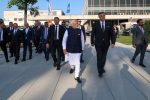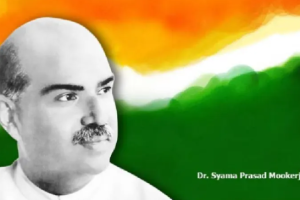The spike-studded Emergency boot is now on the other foot, or so the Lutyen’s intelligentsia would have the Indian electorate believe. At this very moment, we are told, a ‘maha-Emergency’ is in force. Democratic insitutions are being insidiously subverted and the Constitution given the go-by.
Survivors of the Emergency, who suffered through its excesses, may see this as a trivialisation of their own sacrifices and struggle. After all, the aam aadmi today is at liberty to go about his business as usual and hasn’t experienced any loss of constitutionally mandated freedoms. Nor has there been a discernible upswing in civil rights violations or curbs on free speech.
The liberal elite, however, has it that demonetisation, sporadic attacks by gau rakshaks and the pro-government stance of certain sections of the media add up to an ‘undeclared Emergency’ — thus giving anyone who has a grievance against the government a brush with which to paint it black.
The BJP parivar responded to the smear campaign by turning the 43rd anniversary of Emergency into a cause celebre. TV shows, seminars, book releases, lectures, blogs and a slew of articles recalled the horrors of Emergency. Not to mention a fiery speech by Prime Minister Narendra Modi, in which he declared that the psyche and character of the Congress was the same as in 1975, when it stripped citizens of their constitutional freedoms and fundamental rights.
Observing June 25 as ‘Black Day’ made eminent political sense for three reasons. First, to defuse the undeclared Emergency narrative, which is beginning to find traction among disgruntled sections of society. Second, to tell the electorate that the Congress is capable of subverting democracy with unmatched ruthlesness. Third, to remind potential allies of the Congress how they had suffered under Emergency and to recall the fact that many of the sangh parivar stalwarts emerged from the same stable as Mulayam Singh, Laloo Yadav and Nitish Kumar.
True liberals, as opposed to the ‘pseudo’ variety frequenting bars in Lutyen’s Delhi, may be uncomfortable with the BJP’s near-hegemonistic position and will doubtless disapprove of certain aspects of the NDA regime. For example, the centre’s shabby treatment of the Aam Aadmi Party government in Delhi, the arrest of cyber-citizens for indiscreet posts, the failure to rein in gau rakshaks, unprecedented tax terrorism, etc.
On the other hand, they will acknowledge that the Modi government hasn’t made the slightest dent in the superstructure of the Constitution. Demonetisation was a drastic move but certainly well within the limits of executive power. Likewise, the Delhi lieutenant-governor’s harassment of the AAP government is unfair but perfectly legal — a function of a flawed model of statehood, which allows the Centre indirect but absolute control. Gau rakshaks are a law and order problem; it’s not as if these miscreants enjoy the support of the State.
As for free expression, one in a billion social media posts may land the author in jail but by and large, one can speak, tweet and post with impunity. There’s always a risk of being trolled, but External Affairs minister Sushma Swaraj has shown us how to deal with cyber-bullies. In any case, citizens in the UK or US are just as likely to be arrested for questionable posts.
Of course, the litmus test of the Modi government’s respect for democratic norms is still a couple of months away. Justice Ranjan Gogoi is slated to take over as Chief Justice of India when the current incumbent, Dipak Misra, demits office on October 2. Damaging rumours on the possible supersession of Justice Gogoi were discussed in these columns last week.
Law minister Ravi Shankar Prasad sought to allay fears of supersession by asserting that the convention of the CJI recommending the senior-most judge of the Supreme Court as his successor was clear. Unfortunately, he stopped short of categorically stating that Justice Gogoi would be sworn in as CJI, merely saying “when the name comes to us, we will discuss it”.
There’s really nothing to discuss. Neither CJI Dipak Misra nor the NDA government can afford to defy convention by skipping over Justices Gogoi and AK Sikri and appointing Justice S A Bobde (who in the normal course would take over as CJI in November next year). To do so would be to justify the nasty allegations of de facto Emergency. Prime Minister Modi pointed to the Congress’ failed impeachment motion against CJI Misra to bolster his argument that it hadn’t outgrown the Emergency mindset. He cannot, therefore, be seen to partake of that mindset by setting aside the order of succession, which has only been done once in the history of free India – under Indira Gandhi.
Bhavdeep Kang is a senior journalist with 35 years of experience in working with major newspapers and magazines. She is now an independent writer and author.
























